
George Orwell and the Cold War: A Reconsideration
Mises.org& https://www.lewrockwell.com
[From Reflections on America, 1984: An Orwell Symposium. Ed. Robert Mulvihill. Athens and London, University of Georgia Press, 1986.]
In a recent and well-known article, Norman Podhoretz has attempted to conscript George Orwell into the ranks of neoconservative enthusiasts for the newly revitalized cold war with the Soviet Union.1If Orwell were alive today, this truly “Orwellian” distortion would afford him considerable wry amusement. It is my contention that the cold war, as pursued by the three superpowers of Nineteen Eighty-Four, was the key to their successful imposition of a totalitarian regime upon their subjects. We all know that Nineteen Eighty-Four was a brilliant and mordant attack on totalitarian trends in modern society, and it is also clear that Orwell was strongly opposed to communism and to the regime of the Soviet Union. But the crucial role of a perpetual cold war in the entrenchment of totalitarianism in Orwell’s “nightmare vision” of the world has been relatively neglected by writers and scholars.In Nineteen Eighty-Four there are three giant superstates or blocs of nations: Oceania (run by the United States, and including the British Empire and Latin America), Eurasia (the Eurasian continent), and Eastasia (China, southeast Asia, much of the Pacific).
The superpowers are always at war, in shifting coalitions and alignments against each other. The war is kept, by agreement between the superpowers, safely on the periphery of the blocs, since war in their heartlands might actually blow up the world and their own rule along with it. The perpetual but basically phony war is kept alive by unremitting campaigns of hatred and fear against the shadowy foreign Enemy. The perpetual war system is then used by the ruling elite in each country to fasten totalitarian collectivist rule upon their subjects. As Harry Elmer Barnes wrote, this system “could only work if the masses are always kept at a fever heat of fear and excitement and are effectively prevented from learning that the wars are actually phony. To bring about this indispensable deception of the people requires a tremendous development of propaganda, thought-policing, regimentation, and mental terrorism.” And finally, “when it becomes impossible to keep the people any longer at a white heat in their hatred of one enemy group of nations, the war is shifted against another bloc and new, violent hate campaigns are planned and set in motion.”2

From Orwell’s time to the present day, the United States has fulfilled his analysis or prophecy by engaging in campaigns of unremitting hatred and fear of the Soviets, including such widely trumpeted themes (later quietly admitted to be incorrect) as “missile gap” and “windows of vulnerability.” What Garet Garrett perceptively called “a complex of vaunting and fear” has been the hallmark of the American as well as of previous empires:3 the curious combination of vaunting and braggadocio that insists that a nation-state’s military might is second to none in any area, combined with repeated panic about the intentions and imminent actions of the “empire of evil” that is marked as the Enemy. It is the sort of fear and vaunting that makes Americans proud of their capacity to “overkill” the Russians many times and yet agree enthusiastically to virtually any and all increases in the military budget for mightier weapons of mass destruction. Senator Ralph Flanders (Republican, Vermont) pinpointed this process of rule through fear when he stated during the Korean War:
Fear is felt and spread by the Department of Defense in the Pentagon. In part, the spreading of it is purposeful. Faced with what seem to be enormous armed forces aimed against us, we can scarcely expect the Department of Defense to do other than keep the people in a state of fear so that they will be prepared without limit to furnish men and munitions.4 This applies not only to the Pentagon but to its civilian theoreticians, the men whom Marcus Raskin, once one of their number, has dubbed “the mega-death intellectuals.” Thus Raskin pointed out that their most important function is to justify and extend the existence of their employers. … In order to justify the continued large-scale production of these [thermonuclear] bombs and missiles, military and industrial leaders needed some kind of theory to rationalize their use. … This became particularly urgent during the late 1950s, when economy-minded members of the Eisenhower Administration began to wonder why so much money, thought, and resources, were being spent on weapons if their use could not be justified. And so began a series of rationalizations by the “defense intellectuals” in and out of the Universities. … Military procurement will continue to flourish, and they will continue to demonstrate why it must. In this respect they are no different from the great majority of modern specialists who accept the assumptions of the organizations which employ them because of the rewards in money and power and prestige. … They know enough not to question their employers’ right to exist.5
In addition to the manufacture of fear and hatred against the primary Enemy, there have been numerous Orwellian shifts between the Good Guys and the Bad Guys. Our deadly enemies in World War II, Germany and Japan, are now considered prime Good Guys, the only problem being their unfortunate reluctance to take up arms against the former Good Guys, the Soviet Union. China, having been a much lauded Good Guy under Chiang Kai-shek when fighting Bad Guy Japan, became the worst of the Bad Guys under communism, and indeed the United States fought the Korean and Vietnamese wars largely for the sake of containing the expansionism of Communist China, which was supposed to be an even worse guy than the Soviet Union. But now all that is changed, and Communist China is now the virtual ally of the United States against the principal Enemy in the Kremlin.
Along with other institutions of the permanent cold war, Orwellian New-speak has developed richly. Every government, no matter how despotic, that is willing to join the anti-Soviet crusade is called a champion of the “free world.” Torture committed by “totalitarian” regimes is evil; torture undertaken by regimes that are merely “authoritarian” is almost benign. While the Department of War has not yet been transformed into the Department of Peace, it was changed early in the cold war to the Department of Defense, and President Reagan has almost completed the transformation by the neat Orwellian touch of calling the MX missile “the Peacemaker.”

As early as the 1950s, an English publicist observed that “Orwell’s main contention that ‘cold war’ is now an essential feature of normal life is being verified more and more from day to day. No one really believes in a ‘peace settlement’ with the Soviets, and many people in positions of power regard such a prospect with positive horror.” He added that “a war footing is the only basis of full employment.”6
And Harry Barnes noted that “the advantages of the cold war in bolstering the economy, avoiding a depression, and maintaining political tenure after 1945 were quickly recognized by both politicians and economists.”
The most recent analysis of Orwell’s Nineteen Eighty-Four in terms of permanent cold war was in U.S. News and World Report, in its issue marking the beginning of the year 1984:
No nuclear holocaust has occurred but Orwell’s concept of perpetual local conflict is borne out. Wars have erupted every year since 1945, claiming more than 30 million lives. The Defense Department reports that there currently are 40 wars raging that involve one-fourth of all nations in the world — from El Salvador to Kampuchea to Lebanon and Afghanistan.
Like the constant war of 1984, these post-war conflicts occurred not within superpower borders but in far-off places such as Korea and Vietnam. Unlike Orwell’s fictitious superpowers, Washington and Moscow are not always able to control events and find themselves sucked into local wars such as the current conflict in the Middle East heightening the risk of a superpower confrontation and use of nuclear armaments.7
But most Orwell scholars have ignored the critical permanent-cold-war underpinning to the totalitarianism in the book. Thus, in a recently published collection of scholarly essays on Orwell, there is barely a mention of militarism or war. 8
In contrast, one of the few scholars who have recognized the importance of war in Orwell’s Nineteen Eighty-Fourwas the Marxist critic Raymond Williams. While deploring the obvious anti-Soviet nature of Orwell’s thought, Williams noted that Orwell discovered the basic feature of the existing two- or three-superpower world, “oligarchical collectivism,” as depicted by James Burnham, in his Managerial Revolution (1940), a book that had a profound if ambivalent impact upon Orwell. As Williams put it:
Orwell’s vision of power politics is also close to convincing. The transformation of official “allies” to “enemies” has happened, almost openly, in the generation since he wrote. His idea of a world divided into three blocs — Oceania, Eurasia, and Eastasia, of which two are always at war with the other though the alliances change — is again too close for comfort. And there are times when one can believe that what “had been called England or Britain” has become simply Airship One.9
A generation earlier, John Atkins had written that Orwell had “discovered this conception of the political future in James Burnham’s Managerial Revolution.” Specifically, “there is a state of permanent war but it is a contest of limited aims between combatants who cannot destroy each other. The war cannot be decisive. … As none of the states comes near conquering the others, however the war deteriorates into a series of skirmishes [although]. … The protagonists store atomic bombs.”10
To establish what we might call this “revisionist” interpretation of Nineteen Eighty-Four we must first point out that the book was not, as in the popular interpretation, a prophecy of the future so much as a realistic portrayal of existing political trends. Thus, Jeffrey Meyers points out that Nineteen Eighty-Four was less a “nightmare vision” (Irving Howe’s famous phrase) of the future than “a very concrete and naturalistic portrayal of the present and the past,” a “realistic synthesis and rearrangement of familiar materials.” And again, Orwell’s “statements about 1984 reveal that the novel, though set in a future time, is realistic rather than fantastic, and deliberately intensifies the actuality of the present.” Specifically, according to Meyers, Nineteen Eighty-Four was not “totalitarianism after its world triumph” as in the interpretation of Howe, but rather “the very real though unfamiliar political terrorism of Nazi Germany and Stalinist Russia transposed into the landscape of London in 1941–44.”11 And not only Burnham’s work but the reality of the 1943 Teheran Conference gave Orwell the idea of a world ruled by three totalitarian superstates.
Bernard Crick, Orwell’s major biographer, points out that the English reviewers of Nineteen Eighty-Four caught on immediately that the novel was supposed to be an intensification of present trends rather than a prophecy of the future. Crick notes that these reviewers realized that Orwell had “not written utopian or anti-utopian fantasy … but had simply extended certain discernible tendencies of 1948 forward into 1984.”12 Indeed, the very year 1984 was simply the transposition of the existing year, 1948. Orwell’s friend Julian Symons wrote that 1984 society was meant to be the “near future,” and that all the grim inventions of the rulers “were just extensions of ‘ordinary’ war and post-war things.” We might also point out that the terrifying Room 101 in Nineteen Eighty-Four was the same numbered room in which Orwell had worked in London during World War II as a British war propagandist.

But let Orwell speak for himself. Orwell was distressed at many American reviews of the book, especially in Timeand Life, which, in contrast to the British, saw Nineteen Eighty-Four as the author’s renunciation of his long-held devotion to democratic socialism. Even his own publisher, Frederic Warburg, interpreted the book in the same way. This response moved Orwell, terminally ill in a hospital, to issue a repudiation. He outlined a statement to Warburg, who, from detailed notes, issued a press release in Orwell’s name. First, Orwell noted that, contrary to many reviews, Nineteen Eighty-Four was not prophecy but an analysis of what could happen, based on present political trends. Orwell then added: “Specifically, the danger lies in the structure imposed on Socialist and on liberal capitalist communities by the necessity to prepare for total war with the USSR and the new weapons, of which of course the atomic bomb is the most powerful and the most publicized. But danger also lies in the acceptance of a totalitarian outlook by intellectuals of all colours.” After outlining his forecast of several world superstates, specifically the Anglo-American world (Oceania) and a Soviet-dominated Eurasia, Orwell went on:
If these two great blocs line up as mortal enemies it is obvious that the Anglo-Americans will not take the name of their opponents. … The name suggested in 1984 is of course Ingsoc, but in practice a wide range of choices is open. In the USA the phrase “American” or “hundred per cent American” is suitable and the qualifying adjective is as totalitarian as any could wish.13
We are about as far from the world of Norman Podhoretz as we can get. While Orwell is assuredly anti-Communist and anticollectivist his envisioned totalitarianism can and does come in many guises and forms, and the foundation for his nightmare totalitarian world is a perpetual cold war that keeps brandishing the horror of modern atomic weaponry.
Shortly after the atom bomb was dropped on Japan, George Orwell pre-figured his world of Nineteen Eighty-Four in an incisive and important analysis of the new phenomenon. In an essay entitled “You and the Atom Bomb,” he noted that when weapons are expensive (as the A-bomb is) politics tends to become despotic, with power concentrated into the hands of a few rulers. In contrast, in the day when weapons were simple and cheap (as was the musket or rifle, for instance) power tends to be decentralized. After noting that Russia was thought to be capable of producing the A-bomb within five years (that is, by 1950), Orwell writes of the “prospect,” at that time, “of two or three monstrous super-states, each possessed of a weapon by which millions of people can be wiped out in a few seconds, dividing the world between them.” It is generally supposed, he noted, that the result will be another great war, a war which this time will put an end to civilization. But isn’t it more likely, he added, “that surviving great nations make a tacit agreement never to use the bomb against one another? Suppose they only use it, or the threat of it, against people who are unable to retaliate?”
Returning to his favorite theme, in this period, of Burnham’s view of the world in The Managerial Revolution,Orwell declares that Burnham’s geographical picture of the new world has turned out to be correct. More and more obviously the surface of the earth is being parceled off into three great empires, each self-contained and cut off from contact with the outer world, and each ruled, under one disguise or another by a self-elected oligarchy. The haggling as to where the frontiers are to be drawn is still going on, and will continue for some years.
Orwell then proceeds gloomily:
The atomic bomb may complete the process by robbing the exploited classes and peoples of all power to revolt, and at the same time putting the possessors of the bomb on a basis of equality. Unable to conquer one another they are likely to continue ruling the world between them, and it is difficult to see how the balance can be upset except by slow and unpredictable demographic changes.
In short, the atomic bomb is likely “to put an end to large-scale wars at the cost of prolonging ‘a peace that is no peace.’” The drift of the world will not be toward anarchy, as envisioned by H.G. Wells, but toward “horribly stable … slave empires.14
Over a year later, Orwell returned to his pessimistic perpetual-cold-war analysis of the postwar world. Scoffing at optimistic press reports that the Americans “will agree to inspection of armaments,” Orwell notes that “on another page of the same paper are reports of events in Greece which amount to a state of war between two groups of powers who are being so chummy in New York.” There are two axioms, he added, governing international affairs. One is that “there can be no peace without a general surrender of sovereignty,” and another is that “no country capable of defending its sovereignty ever surrenders it.” The result will be no peace, a continuing arms race, but no all-out war.15

Orwell completes his repeated wrestling with the works of James Burnham in his review of The Struggle for the World (1947). Orwell notes that the advent of atomic weapons has led Burnham to abandon his three-identical-superpowers view of the world, and also to shuck off his tough pose of value-freedom. Instead, Burnham is virtually demanding an immediate preventive war against Russia,” which has become the collectivist enemy, a preemptive strike to be launched before Russia acquires the atomic bomb.
While Orwell is fleetingly tempted by Burnham’s apocalyptic approach, and asserts that domination of Britain by the United States is to be preferred to domination by Russia, he emerges from the discussion highly critical. After all, Orwell writes, the
Russian regime may become more liberal and less dangerous a generation hence. … Of course, this would not happen with the consent of the ruling clique, but it is thinkable that the mechanics of the situation may bring it about. The other possibility is that the great powers will be simply too frightened of the effects of atomic weapons ever to make use of them. But that would be much too dull for Burnham. Everything must happen suddenly and completely.16
George Orwell’s last important essay on world affairs was published in Partisan Review in the summer of 1947. He there reaffirmed his attachment to socialism but conceded that the chances were against its coming to pass. He added that there were three possibilities ahead for the world. One (which, as he had noted a few months before was the new Burnham solution) was that the United States would launch an atomic attack on Russia before Russia developed the bomb. Here Orwell was more firmly opposed to such a program than he had been before. For even if Russia were annihilated, a preemptive attack would only lead to the rise of new empires, rivalries, wars, and use of atomic weapons. At any rate, the first possibility was not likely. The second possibility, declared Orwell, was that the cold war would continue until Russia got the bomb, at which point world war and the destruction of civilization would take place. Again, Orwell did not consider this possibility very likely. The third, and most likely, possibility is the old vision of perpetual cold war between blocs of superpowers. In this world,
the fear inspired by the atomic bomb and other weapons yet to come will be so great that everyone will refrain from using them. … It would mean the division of the world among two or three vast super-states, unable to conquer one another and unable to be overthrown by any internal rebellion. In all probability their structure would be hierarchic, with a semi-divine caste at the top and outright slavery at the bottom, and the crushing out of liberty would exceed anything the world has yet seen. Within each state the necessary psychological atmosphere would be kept up by complete severance from the outer world, and by a continuous phony war against rival states. Civilization of this type might remain static for thousands of years.17
Orwell (perhaps, like Burnham, now fond of sudden and complete solutions) considers this last possibility the worst.
It should be clear that George Orwell was horrified at what he considered to be the dominant trend of the postwar world: totalitarianism based on perpetual but peripheral cold war between shifting alliances of several blocs of super states. His positive solutions to this problem were fitful and inconsistent; in Partisan Review he called wistfully for a Socialist United States of Western Europe as the only way out, but he clearly placed little hope in such a development. His major problem was one that affected all democratic socialists of that era: a tension between their anticommunism and their opposition to imperialist, or at least interstate, wars. And so at times Orwell was tempted by the apocalyptic preventive-atomic-war solution, as was even Bertrand Russell during the same period. In another, unpublished article, “In Defense of Comrade Zilliacus,” written at some time near the end of 1947, Orwell, bitterly opposed to what he considered the increasingly procommunist attitude of his own Labour magazine, the Tribune, came the closest to enlisting in the cold war by denouncing neutralism and asserting that his hoped-for Socialist United States of Europe should ground itself on the backing of the United States of America. But despite these aberrations, the dominant thrust of Orwell’s thinking during the postwar period, and certainly as reflected in Nineteen Eighty-Four, was horror at a trend toward perpetual cold war as the groundwork for a totalitarianism throughout the world. And his hope for eventual loosening of the Russian regime, if also fitful, still rested cheek by jowl with his more apocalyptic leanings.
Notes
1.Norman Podhoretz, “If Orwell Were Alive Today,” Harper’s, January 1983, pp. 30-37.
2.Harry Elmer Barnes, “How ‘Nineteen Eighty-Four’ Trends Threaten American Peace, Freedom, and Prosperity,” in Revisionism: A Key to Peace and Other Essays (San Francisco: Cato Institute, 1980), pp. 142-43. Also see Barnes, An Intellectual and Cultural History of the Western World, 3d rev. ed., 3 vols. (New York: Dover, 1965), 3: 1324-1332; and Murray N. Rothbard, “Harry Elmer Barnes as Revisionist of the Cold War,” in Harry Elmer Barnes, Learned Crusader, ed. A. Goddard (Colorado Springs: Ralph Myles, 1968). pp. 314-38. For a similar analysis, see F.J.P. Veal[e] Advance to Barbarism(Appleton, Wis.: C.C. Nelson, 1953), pp. 266-84.
3.Garet Garrett, The People’s Pottage (Caldwell, Idaho: Caxton Printers, 1953), pp. 154-57.
4.Quoted in Garrett, The People’s Pottage, p. 154.
5.Marcus Raskin, “The Megadeath Intellectuals,” New York Review of Books, November 14, 1963, pp. 6-7. Also see Martin Nicolaus, “The Professor, the Policeman and the Peasant,” Viet-Report, June-July 1966, pp. 15-19; and Fred Kaplan, The Wizards of Armageddon (New York: Simon and Schuster, 1983). [6]Barnes, “‘Nineteen Eighty-Four’ Trends,” p. 176.
6.Barnes, “‘Nineteen Eighty-Four’ Trends,” p. 176.
7.U.S. News and World Report, December 26, 1983, pp. 86-87.
8.Irving Howe, ed., 1984 Revisited: Totalitarianism in Our Century (New York: Harper and Row, Perennial Library, 1983). There is a passing reference in Robert Nisbet’s essay and a few references in Luther Carpenter’s article on the reception given to Nineteen Eighty-Four by his students at a community college on Staten Island (pp. 180, 82).
9.Raymond Williams. George Orwell (New York: Columbia University Press, 1971), p. 76.
10.John Atkins, George Orwell (London: Caldor and Boyars, 1954), pp. 237-38.
11.Jeffrey Meyers, A Reader’s Guide to George Orwell (London: Thames and Hudson, 1975), pp. 144-45. Also, “Far from being a picture of the totalitarianism or the future 1984 is, in countless details, a realistic picture of the totalitarianism of the present” (Richard J. Voorhees, The Paradox of George Orwell, Purdue University Studies, 1961, pp. 85-87).
12.Bernard Crick, George Orwell: A Life (London: Seeker and Warburg, 1981), p. 393. Also see p. 397.
13.George Orwell, The Collected Essays, Journalism and Letters of George Orwell, ed. Sonia Orwell and Ian Angus, 4 vols. (New York: Harcourt Brace Jovanovich, 1968), 4:504 (hereafter cited as CEJL). Also see Crick, George Orwell, pp. 393-95.
14.George Orwell, “You and the Atom Bomb,” Tribune, October 19, 1945, reprinted in CEJL, 4:8-10.
15.George Orwell, “As I Please,” Tribune, December 13, 1946, reprinted in CEJL, 4:255.
16.George Orwell, “Burnham’s View of the Contemporary World Struggle,” New Leader (New York), March 29, 1947, reprinted in CEJL, 4:325.
17.George Orwell. “Toward European Unity,” Partisan Review July-August 1947, reprinted in CEJL, 4:370-75.